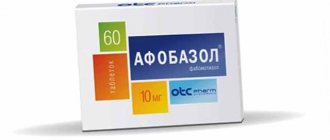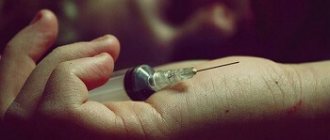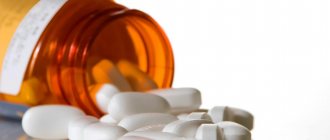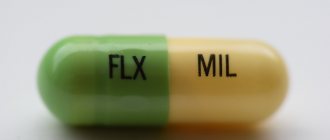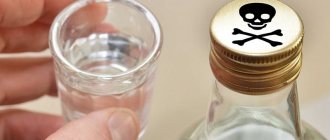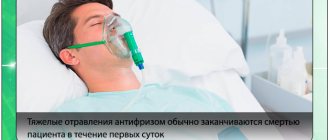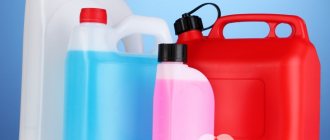coffee "
Coffee has a pleasant taste and contains many beneficial substances. Taking it in small quantities helps to raise tone, restore emotional mood, and improve the functioning of internal organs. After drinking a large amount of the drink, poisoning occurs with the formation of unfavorable symptoms and the likelihood of complications.
Symptoms of Caffeine Poisoning
Caffeine poisoning occurs after taking one or more grams of the substance. The lethal dose of caffeine for humans is more than 10 grams. For example, one cup of coffee contains from 100 to 120 milligrams.
These symptoms appear when there is excess caffeine in the body:
- convulsions, fever, chills;
- heart rhythm disturbance;
- dizziness;
- nausea, nervousness;
- facial redness;
- decreased sensitivity;
- increased sweating;
- incontinence, diarrhea;
- insomnia.
With a severe overdose, hallucinations appear, the patient is poorly oriented in time and space.
Main symptoms of caffeine overdose
Intoxication examination
If a person has had too much coffee, he or she may notice a change in how he or she feels. Early symptoms of acute poisoning are similar to those of anorexia, tremor and anxiety, accompanied by nausea, vomiting, tachycardia and confusion. Caffeine poisoning can cause delirium, attacks of supraventricular and ventricular tachyarrhythmias, hypokalemia and hyperglycemia. People who drink a lot of the drink are nervous, irritable, restless. They experience trembling, muscle twitching (when they shake after drinking coffee), sleep disturbances, and heart palpitations.
For blood tests, cross-reactions with theophylline are used: a blood concentration of 1-10 mg/l is normal for a coffee drinker, and 80 mg/l is associated with death.
It is rare that children give coffee to their children, but the substance is transmitted even through breast milk if the mother is overly in love with coffee. The child becomes ill, which is manifested by nausea, increased muscle tone and sudden relaxation. Vomiting, rapid breathing and shock are dangerous signs of caffeine overdose.
Be sure to tell your doctor about the amount of caffeine-containing products in your diet. To assess your general health, your blood pressure and temperature will be measured, and you will be given a referral for blood and blood tests.
How to remove caffeine from the body?
What to do and how to act in case of caffeine overdose? Under normal conditions, caffeine is eliminated from the body within 24 hours, but in case of an overdose, when the body is working in emergency mode, this process proceeds slowly. If measures are not taken in time, an excess of caffeine in the body can lead to unpleasant consequences.
You can neutralize the effects of caffeine using a few simple rules:
- The first thing you should do after discovering similar symptoms is gastric lavage. Usually the victim is given several glasses of water to drink, and then vomited. This allows you to remove caffeine that has not yet been absorbed from the body.
- If a long amount of time has passed since consuming caffeine, you need to take activated charcoal (at the rate of 1 tablet per 10 kilograms of weight).
- Drinking plenty of water will help remove caffeine.
- The patient needs to ensure free breathing, go outside or open a window.
It is worth remembering that this is only first aid, and even if the condition has stabilized and the symptoms have disappeared, you need to call an ambulance or see a doctor!
What happens when you overdose on caffeine?
First aid and further treatment
1. Provide air access and facilitate ventilation. 2. Stop seizures and blood pressure disorders, if any. In the absence of medications, you can use alcohol in a dose of about 50 ml in terms of pure alcohol. 3. Hypokalemia usually goes away on its own. 4. Continuous monitoring of the victim.
Specific medications and antidotes: Beta-blockers effectively prevent the cardiotoxic effect of caffeine caused by excessive adrenergic stimulation and normalize blood pressure. It is recommended to use intravenously propanolol, 0.01..0.02 mg/kg, or esmodol, 0.05 mg/kg, under the control of heart rate and blood pressure. Esmodol is preferable because has a short half-life and is easy to control.
1. Induce vomiting or perform gastric lavage.
2. Apply activated carbon and enveloping agents.
3. If points 1 and 2 are completed quickly enough (approximately within an hour from the moment of poisoning), laxatives do not need to be prescribed.
4. Ensuring free breathing.
This operation should be done if the patient is unconscious or in a foggy state. 5.
If there is no suspicion of a neck injury, place the patient on his back, tilt his head back and extend the front of the neck. 6.
Apply “Jaw Pressure” to remove the tongue without bending the neck: place the fingers of both hands on the back sides of the jaw and pull forward, pushing the chin. This operation causes pain to the patient, allowing you to assess the degree of coma 7.
Tilt your head to the side, allowing vomit and saliva to flow out.
Caffeine benefits and harms
The harm of caffeine, as well as the benefits, is the subject of much debate. Let's try to figure out how caffeine acts on our body. Despite the terrible consequences of poisoning, coffee has many beneficial properties such as:
- acceleration of mental activity of the brain;
- elimination of headaches;
- dilation of blood vessels;
- drinking coffee drink has a beneficial effect on patients with bronchial asthma;
- is an excellent antidepressant;
- stimulates memory;
- neutralizes drugs and poisons;
- promotes good digestion;
- reduces the risk of liver cirrhosis, diabetes, kidney problems;
The harm and benefits of coffee
It is worth remembering that caffeine only produces beneficial effects when consumed in moderation. Otherwise, serious health problems cannot be avoided. Frequent consumption of caffeine can cause the following consequences:
- Heart problems. So far, the effect of caffeine on the heart has not been fully studied by doctors and is the subject of much debate. But in medical practice, there have been cases where excessive caffeine consumption led to a disease such as coronary heart disease in completely healthy people.
- Lack of calcium absorption. Because of this property of caffeine, its consumption should be reduced by pregnant and lactating women, since during this period a woman needs a maximum of vitamins.
- Effect on potency. The harm of caffeine for men is one of the most common problems faced by coffee lovers of the stronger sex. Scientists have proven that due to excess caffeine in the body, there is a decrease in male sexual function.
- Dehydration. Coffee lovers should pay attention to the amount of liquid they drink and remember the need for additional water intake.
- Do not forget that this drink can cause addiction. It is often difficult to get rid of this addiction. The best time to drink coffee is in the morning, as this way the body gets a boost of energy for the whole day.
Caffeine can become a drug
Signs of caffeine intoxication
In case of poisoning or overdose, a person first begins to feel overexcitement, amounting to a kind of nervous overstrain. The poisoned person feels as if he is shaking from the inside, as if the adrenaline in his blood has increased. This is only the first stage of poisoning. If you stop drinking coffee, tea, including green tea, drink activated charcoal.
Why is coffee harmful?
- Negatively affects the heart and blood vessels.
- Promotes the production of gastric juices (that's why doctors forbid drinking it on an empty stomach).
- May cause an attack of glaucoma: frequent use contributes to a gradual narrowing of the blood vessels in the eyes.
- Disturbs heart rhythms.
- Provokes pressure changes.
But if a single safe standard has not yet been found, then American scientists have established a dose that can be considered lethal. It turns out that this is 100 cups of coffee a day. You may ask: is it really possible to drink such an amount of drink in one day? As it turns out, yes. Some people who work at night even endure such a “horse” dose, trying to drive away sleep with coffee.
At the same time, people always walk on a knife’s edge, because caffeine (just like some dangerous drugs) has the ability to be absorbed into the body very quickly. It is instantly absorbed by all tissues, including the rectal mucosa. In these cases, poisoning from a coffee drink may unexpectedly occur and the symptoms of an overdose will resemble normal intoxication of the body.
Common signs of caffeine poisoning include:
- Vomit.
- Increased breathing.
- Arrhythmia, rapid heartbeat.
- Trembling.
- Tinnitus, dizziness.
- Growing feeling of anxiety.
- Cramps.
Sometimes an overdose can be signaled by an elevated temperature, making it very difficult for a person to calm down. In rare cases, convulsions and delirium may occur.
If the listed symptoms are detected, you should immediately call an ambulance. Before her arrival, it is necessary to take all possible emergency measures or simply be near the victim, because due to an overdose of caffeine, a person may behave inappropriately and harm himself.
How to choose the right coffee?
Also, considerable attention should be paid to the quality of coffee. An improperly prepared or adulterated drink can cause just as many health problems (if not more) than an overdose. When choosing, you should focus your attention on:
- Packaging integrity. If coffee comes into contact with the environment, it will not only soon lose all its qualities for which true connoisseurs love it so much, but will also cause harm to the body. Mostly, thick foil bags are used for coffee beans. It is also worth ensuring that the grains are protected from direct sunlight;
- Product description. The most important thing is to find information on the label such as: country of origin (each producing country has its own taste for one variety or another); degree of roasting (if the degree is low, the drink will have a sour taste, if high, it will be bitter), when choosing, you should pay special attention to types with a high degree of roasting, since this particular product is often counterfeit.
- Appearance. All grains must be the same in shape, size and color.
- The smell should be clearly perceptible, pronounced, but not harsh and cloying.
For ground coffee the criteria are similar. But this does not mean that less attention should be paid during selection. Quite the contrary, ground coffee is often counterfeited. At best, you will come across low-quality raw materials; at worst, it may turn out to be foreign products.
Tips for choosing coffee
Treatment of caffeine-related disorders
Treatment for caffeine-related disorders involves reducing your intake or avoiding caffeinated beverages. Some people experience mild withdrawal symptoms, which include headaches, irritability, and sometimes nausea, but these usually pass fairly quickly.
Prognosis and prevention
With the exception of acute episodes of coffee addiction, people recover from caffeine intoxication without much difficulty. Preventing caffeine-related illnesses requires controlling or avoiding caffeinated drinks, medications, and other sources of caffeine.
Author of the article: Valery Viktorov, Moscow Medicine Portal©
Disclaimer: The information provided in this article about caffeine, caffeine intoxication and addiction is intended for the reader's information only. It is not intended to be a substitute for advice from a healthcare professional.
What do you need to know when buying ground coffee?
- Package. In no case should it be made of plastic; the best choice is glass containers, or at least iron. This way, the coffee will better retain its properties and bring you only pleasure.
- Label. Must contain information: country of manufacture; composition (usually it is either one type or a mixture of two varieties); degree of grinding (this must be taken into account when preparing the drink and the final taste of the product depends on it); shelf life (usually for ground grains it should not be longer than 18 months).
- Appearance. All grains must be of uniform color and the same size. There should be no sticky lumps or foreign bodies.
- Smell. If you choose from ground, instant and bean coffee, the first one has the strongest smell, but this does not mean that it should fill the entire space of the room. Unobtrusiveness is the main characteristic of the aroma of coffee.
How to choose the right coffee?
Where is caffeine used?
Caffeine is sometimes used medicinally in athletic training, and often as an active ingredient in pain medications and some over-the-counter stimulants. Caffeine does not carry the high risk or degree of physical or psychological dependence that other psychoactive substances do. However, coffee or tea drinkers may have some difficulty reducing or completely eliminating their consumption of caffeinated beverages and foods. Symptoms of caffeine intoxication can easily be confused with symptoms of an anxiety disorder.
What should your daily caffeine intake be?
So how much coffee can we drink per day? The daily dose of caffeine is approximately 400 mg, that is, a person can drink 3 to 4 cups of coffee per day without consequences for the body.
But you should not rely only on statistics, because each organism is individual, and if for one five cups of this drink is a common thing, then for another it is a critical dose. We hope this information will help you maintain your health and avoid caffeine poisoning.
What volume of caffeine-containing products leads to poisoning?
If you follow doctors' recommendations, the maximum dose of caffeine should not exceed 150-300 milligrams. 150 mg is 3 cups of instant drink (about the same amount of cereal).
As for tea, the permissible dosage is 3-4 cups of black, or 4-5 cups of green. If you violate these boundaries, you may get poisoned or get unwanted side effects:
- arrhythmia;
- insomnia;
- overexcitement.
The European Food Safety Authority (EFSA) has set upper limits for the permissible amount of consumption: 400 milligrams per day.
The substance is harmful if you abuse caffeine-containing drinks. But there is a category of people who have increased sensitivity to caffeine, or even individual intolerance. Their use of the substance may be accompanied by unpleasant symptoms of overdose.
The dose that can be fatal if taken once is 10-20 grams. But in practice it is difficult to die from an overdose. For an average person weighing 70 kg, you will need as many as 100 cups of coffee.
Video
Watch the following video and find out the whole truth about coffee.
Many people drink at least 2-3 cups of coffee a day. Previously, the drink was considered harmful, but in recent years scientists have found a lot of evidence that coffee is good for the body, prevents the development of many diseases, helps to lose weight, etc. In addition, in the modern rhythm of life, it helps to focus, concentrate, work and live more actively. But how much can you drink without harm, can you be poisoned by coffee and what kind, and what to do if the dose is too high? How to recognize the symptoms of coffee poisoning?
Can you get poisoned from coffee?
You can be poisoned by anything, and coffee in this case is no exception. True, this option is unlikely. This is usually closer to an overdose rather than actual poisoning, since coffee, as a rule, does not contain poison. There is an individual reaction to individual components, as well as exceeding reasonable consumption standards when too much caffeine enters the body.
Doctors report that most cases of caffeine poisoning occur as a result of taking stimulant pills and energy drinks, not from the coffee itself.
However, you can still get poisoned, especially in the following situations:
- If you have drunk too much coffee. A lot in this case is a subjective concept, but definitely more than you usually drink. Exceeding the dose by just one or two cups can lead to unpleasant consequences, especially if you are not used to such doses.
- If the body is weakened, the person has not had enough sleep, or is in a state of stress, the likelihood of coffee poisoning is much greater.
- If you drink coffee on an empty stomach, especially in situations where the body is weakened.
Necessary therapy
Chronic coffee overdose can be treated at home. The doctor will prescribe the medications. The patient is required to comply with several conditions:
- Introduce more ingredients containing calcium, potassium and magnesium into your food.
- To eliminate the negative consequences, completely abandon the drink.
Symptoms of food poisoning are usually relieved by administering an antidote. However, there is no specific antidote for coffee. Therefore, in the inpatient department, doctors provide symptomatic treatment:
- The use of Pipolfen, Morphine, and antipsychotics is indicated. If the patient is in a state of collapse, drugs are administered intravenously.
- For increased heart rate, beta blockers are recommended.
- Reduced blood pressure is raised with Esmolol or Propranolol.
- Reduces high temperature.
- Possibly the use of an oxygen cushion.
As soon as the excess alkaloid leaves the body, the condition stabilizes.
Poisoning with natural and instant coffee
Poisoning with natural coffee usually occurs precisely due to an overdose. As an option, if a person usually drinks a weak instant drink, and then decides to drink a large cup of a strong natural one.
It is much easier to get poisoned with instant coffee. It is processed chemically, and the finished powder or granules usually contain up to 15-20% of the original grains. The rest is stabilizers, preservatives, emulsifiers, dyes, starch, synthetic additives, etc. The cheaper instant coffee is, the more dangerous it is to drink, since there is less and less natural product and more and more chemicals.
Decaffeinated coffee is also unsafe. Caffeine is washed out with chemical solvents, which are also present in minimal doses in the finished product. If the coffee is instant, it also contains all the dyes and preservatives described above.
Most often, people get coffee poisoning due to an individual reaction to artificial components or a combination of them. Therefore, you should not get carried away with an instant drink from an unknown brand if you are prone to allergic reactions or have diseases of the cardiovascular system.
You can get poisoned if you usually drink coffee with milk and suddenly drink black coffee.
Possible consequences
If you constantly drink strong coffee, sooner or later you will face the risk of poisoning and a number of complications requiring medical attention:
- tachycardia;
- dehydration;
- calcium deficiency;
- hypertension.
To prevent consequences, you need to consume your favorite product with restrictions.
If you drink coffee uncontrollably and periodically overdose (not to mention poisoning), this can provoke serious complications:
- tachycardia;
- dehydration due to a strong diuretic effect;
- vasoconstriction and, as a result, hypertension;
- calcium deficiency;
- allergies in infants if a nursing mother drinks this drink;
- during pregnancy - an increase in gestation period, fetal death or miscarriage.
The consequences will be especially severe for people who smoke, take stimulants and combine the drink with alcohol or energy drinks.
Symptoms of coffee poisoning
The first symptoms usually appear within 5-10 minutes after drinking your favorite drink:
- The face turns red from the rush of blood;
- The eyes sparkle;
- Feeling dizzy and weak;
- Heat is felt in the body, it can be sharp or increase gradually;
- The body or limbs may tremble, individual muscles or eyes may twitch;
- The heart beats faster and faster, pain may be felt;
- Breathing is shallow and it can be painful to inhale.
With prolonged intoxication of the body or stable consumption of large amounts of coffee, the following symptoms may occur:
- Nausea or vomiting;
- Stomach upset, diarrhea, cramps;
- More frequent urination in small volumes;
- Body heat, increased sweating.
With a sudden overdose of caffeine (usually from pills or energy drinks), acute phase symptoms may appear:
- The face turns sharply blue, especially around the lips and lips, the area under the eyes;
- Convulsions appear;
- Sticky cold sweat;
- Excessive nervousness or nervousness;
- Hallucinations and delusions.
Clinical picture of coffee poisoning
It is very easy to recognize the signs of a coffee overdose, even though they may be subtle. In most cases, they make themselves felt at an early stage.
Early symptoms:
- Feeling of heat throughout the body. The reason for this may be an excessive amount of adrenaline or increased blood flow to all muscles.
- Redness of the skin of the face. This symptom is the most noticeable. This is provoked by the same increased flow of blood to the muscles.
- Palpitations. This is due to excess adrenaline, which is released into the blood under the influence of caffeine.
- Sparkle in the eyes. The effect of adrenaline stimulates the activity of all glands, including the lacrimal glands. Due to this, there is excessive moisture in the eyes and reflection of light in them.
- Dizziness and headache of varying intensity.
- Feeling of trembling throughout the body, in the limbs.
It is important! The first signs appear twenty minutes after consuming an excess amount of coffee drink.
Caffeine overdose in adults occurs after drinking at least 5 cups of strong coffee per day. Symptoms of poisoning develop gradually and become more pronounced after each new sip of coffee. A person may not notice them at first and attribute the worsening condition to fatigue, lack of sleep and nervous overstrain at work.
How to deal with coffee poisoning?
The list of actions depends on what stage the person is in and how much coffee he drank:
- In the initial stage, if you feel sick 5-10 minutes after a cup of coffee, the best way to cleanse the body is vomiting. You can drink a glass of warm water and also induce vomiting. Provide fresh air flow. If you feel dizzy and weak, lie down or sit down. Drink water and try to breathe deeply. Usually after 15 minutes everything goes away, you may want to sleep.
- For more serious poisoning, if caffeine has already been absorbed into the stomach, or you have drank a lot of coffee over the past 24 hours, milk and banana, fresh air, as well as sorbents - activated carbon or any analogues - can help. You should give up coffee for several days.
- In the acute stage, it is best to call an ambulance. There is no antidote for coffee, so in a hospital setting they usually lower the blood pressure, monitor the condition, and administer medications to help remove toxins faster and prevent a critical condition.
First aid and further treatment
If you notice signs of a coffee overdose in yourself or someone you know, it is important to provide first aid to avoid serious complications.
Recommendations:
- Drinking plenty of fluids frequently. Caffeine causes dehydration, so you need to drink plenty of water. You need to add a small amount of salt to your drink. This trick will help retain fluid in the body.
- You need to eat a banana. Professional bartenders claim that with the help of bananas you can get rid of internal tension. This is due to the fact that they contain a large amount of potassium, which has a positive effect on the human cardiovascular system.
- Fresh air. In case of a coffee overdose, you need to go outside and take a deep breath of air. Walking slowly and getting oxygen in is very beneficial. This will help get rid of dizziness and redness of the facial skin.
When a case of coffee overdose is severe, there is cyanosis of the skin, poor health, you should rinse the stomach and induce vomiting by pressing the root of the tongue. After this, you need to seek medical help, and in the meantime, provide the victim with plenty of fluids.
Conclusions:
- Natural coffee does not contain poisons, and you can only get poisoned if you exceed the usual dosage.
- Instant coffee often causes poisoning, since most of its composition is chemical components, to which there can be an individual reaction.
- Poisoning from one cup of coffee usually goes away within 15-20 minutes.
- If a person is very ill and the nasolabial triangle turns blue, it is necessary to call an ambulance.
- People usually don't die from coffee poisoning.
Drugs in the xanthine group include caffeine
and its salt (caffeine-sodium benzoate), as well as theophylline, aminophylline (aminophylline, diaphylline), diprophylline, theophedrine (a combination of theophylline with ephedrine). Caffeine has a pronounced effect on the cerebral cortex. Theophylline and aminophylline have antispasmodic and vasodilating effects. The drugs are well absorbed through the mucous membranes of the stomach and intestines, most of them are metabolized in the liver and excreted by the kidneys.
Signs of caffeine poisoning
observed after taking 1 g or more of the substance. The lethal dose is over 10 g. Aminophylline is more toxic. When administered intravenously, the lethal dose is about 0.1 g; when administered in suppositories - 25-100 mg/kg. Cases of death have been described in children with repeated use of aminophylline in suppositories (cumulation is possible).
Pathogenesis and symptoms of caffeine poisoning.
In the pathogenesis of acute poisoning, the effect of caffeine on the central nervous system and circulatory system is important. A sharp stimulation of the central nervous system, primarily the cortex and spinal cord, causes the occurrence of a pronounced psychomotor reaction and clonic-tonic convulsions. Toxic doses of caffeine quickly lead to depletion of nerve cells, which manifests itself in a soporotic state. Euphylline and theobromine in toxic doses depress the central nervous system.
Of significant importance is the direct stimulating effect of toxic doses of caffeine on the heart muscle, which, in combination with the heart’s increased need for oxygen, manifests itself primarily in rhythm disorders (tachycardia, extrasystole). Deterioration of heart function, dilation of blood vessels and increased permeability, hypoxic changes lead to edema and hemorrhages. Depletion of the vasomotor center and weakening of the contractile function of the myocardium sometimes cause acute cardiovascular failure with symptoms of collapse. Death can also occur from cardiac paralysis, especially with rapid intravenous administration of aminophylline.
Symptoms of acute caffeine poisoning
are rapidly onset severe psychomotor disorders: anxiety, dizziness, tinnitus, trembling of limbs, twitching of individual muscle groups, hallucinations. Redness of the face, dilated pupils, extrasystole, increased breathing, and increased temperature are observed.
The irritating effect on the mucous membranes of the stomach and intestines is manifested by nausea, vomiting, and pain in the epigastric region. In the future, as poisoning progresses, clonic-tonic convulsions may occur. The pulse increases sharply, up to the development of paroxysmal tachycardia, and extrasystoles are observed. A stuporous state occurs with delirium, a weak rapid arrhythmic pulse, and a sharp decrease in blood pressure.
In case of overdose and poisoning with theophylline and its synthetic derivatives - aminophylline and diprophylline, heartburn, nausea, persistent vomiting, and diarrhea occur due to their pronounced irritant effect. If vomiting is prolonged, dehydration may occur, thirst and hyperthermia may appear. When administered intravenously, clonic-tonic convulsions and a collaptoid reaction occur.
First aid and treatment for caffeine poisoning.
Help for acute poisoning with caffeine and its analogues taken orally consists of gastric lavage with a 1-2% solution of tannin or a suspension of activated charcoal, and the appointment of a saline laxative. To remove the residue that is not absorbed from the rectum, aminophylline is prescribed an enema. Forced diuresis is performed with blood alkalization (see p. 37). In the stage of excitation, aminazine is used (2 ml of a 2.5% solution intramuscularly with 5 ml of a 0.5% solution of novocaine), sodium thiopental (90 ml of a 2.5% solution intravenously slowly), for convulsions - bar-bamil (3 ml 10 % solution intravenously). In severe cases, V. A. Luzhnikov and A. A. Yaroslavsky (1974) recommend intramuscular administration of 1 ml of a 1% solution of promedol with diprazine (3-4 ml of a 2.5% solution), aminazine (1 ml of a 2.5% solution) and novocaine. Help with symptoms of acute cardiovascular failure (see p. 35). Vasoconstrictors - adrenaline hydrochloride, norepinephrine hydrotartrate, ephedrine hydrochloride and mesatone are prescribed with caution due to their synergistic effect with theophylline and its derivatives. Therefore, in case of collapse, it is preferable to transfuse plasma and its substitutes. To combat edema and hemorrhages, ascorbic acid, rutin, ascorutin, and antihistamines (diphenhydramine, diprazine, hydrocortisone acetate, etc.) are used. For persistent vomiting, isotonic sodium chloride solution or 5% glucose solution is administered parenterally. Hypokalemia is eliminated by administering potassium chloride.
Vitamin therapy (thiamine bromide) and antibiotic therapy are advisable.
Treatment of acute poisoning, 1982
Caffeine
is used throughout the world and is found in a wide range of foods and over-the-counter medicines. Its action causes various pharmacological changes in the nervous system, including sensitization of dopamine receptors, antagonism of adenosine receptors and antagonism of benzodiazepine receptors. It should be noted that non-caffeine components contained in coffee are antagonists to opiate receptors. One cup of coffee contains approximately 100-150 mg of caffeine, a glass of tea contains half, and a glass of cola drink (Coca-Cola, Pepsi-Cola) contains a third of this dose. Chocolate, which is consumed mostly by children, contains a certain amount of caffeine (approximately 25 mg per bar). The half-life of caffeine ranges from 3 to 10 hours, and the maximum concentration in blood plasma is determined after approximately 30 minutes. Taking caffeine in a dose of 50-100 mg causes a feeling of an influx of physical and mental energy, and in a dose exceeding 0.5 grams it can cause initial manifestations of intoxication. It should be noted that some individuals can consume 2-3 g of caffeine without any complications.
Signs of acute caffeine intoxication
(50 to 100 mg) include: increased alertness, a sense of well-being, and good performance on verbal and motor tasks. In addition, caffeine increases diuresis, stimulates cardiac activity, enhances gastric motility and secretion of gastric juice, and increases blood pressure. Increased activity is experienced with a feeling of satisfaction, which leads to the continuation and subsequent systematic use of psychostimulants.
The effect of psychostimulants quickly weakens with repeated use; in people who chronically consume caffeine, tolerance to its action develops, and therefore psychological dependence appears, leading to the need to increase the dose of the drug. Acute intoxication with higher doses causes anxiety, psychomotor agitation and restlessness, irritability and psychophysiological complaints such as muscle twitching, facial flushing, nausea, diuresis, gastrointestinal disorders and insomnia. In this case, facial skin flushing, increased diuresis, gastrointestinal disorders, muscle twitching, accelerated thinking and speech, tachycardia (arrhythmia), increased ability to work and decreased feeling of fatigue, psychomotor agitation, increased sensitivity to light and sounds are observed. In severe poisoning, peptic ulcers, respiratory failure, convulsions and collapsed states develop.
Approximately 25% of caffeine abusers develop withdrawal symptoms after 15-18 hours, accompanied by a prolonged headache with a throbbing sensation, which decreases after taking coffee or chifir. The development of lethargic drowsiness, irritability, anhedonia and depression is possible. The higher the daily dose, the greater the likelihood of developing depression. Abstinence symptoms go away on their own within 4-5 days. Chronic consumption of coffee stimulates increased secretion of hydrochloric acid in the stomach, which can serve as a provoking factor in the development of peptic ulcers. Cardiac arrhythmia is quite common. Often, constant consumption of drinks containing caffeine improves the subjective state of women who suffer from fibrocystic diseases of the genital organs, so coffee drinkers need to be examined by a gynecologist. Often, chronic caffeine abuse is mistakenly regarded as a manifestation of an anxiety-depressive or pseudoneurotic disorder. To “treat” such patients, anxiolytic and psychomimetic drugs are often used, which are absolutely not effective in these cases, but only provoke the development of a deeper combined psychophysical dependence.
Dependence on psychoanaleptic drugs can be recognized by the alternation of hyperactivity and elevated mood with inactivity and depression. Long-term use of large doses can lead to repetitive stereotypical behavior (combing hair, shaking clothes, etc.). Abuse of strong brewed tea - chifir
- Convulsive seizures and confusion may occur. Persons who chronically use chifir gradually develop personality changes of the psychopathization type with noticeable mood swings, incontinence of affects, and social decline.
Why is coffee harmful?
If you do not combine it with drinking cognac, drink no more than 2-3 cups a day, negative consequences will not appear. By violating these recommendations, a person risks encountering several factors that are unpleasant for the body:
- Dehydration. The popular product has a diuretic effect.
- Potassium deficiency. The microelement is quickly washed out, so it is necessary to maintain its concentration by including cottage cheese, yogurt, and kefir in the diet.
- Hypertension. Vasoconstriction provokes a short-term but sharp increase in pressure. The effect can be reduced if you do not add fat milk and sweeteners.
That is why it is forbidden to indulge in coffee if you have the following contraindications:
- cardiovascular diseases;
- mental disorders;
- CNS disorders;
- children or old age;
- pregnancy and lactation.
Lethal dose
Drinking 100 cups per day causes death. At the same time, the caffeine content is approximately 10 g. Fortunately, the alkaloid is quickly eliminated and practically does not accumulate, otherwise doctors have encountered caffeine poisoning much more often. For example, it is known that Honore de Balzac preferred to drink about 50 glasses a day for better performance.
Caffeine has analogues that have similar effects on the body.
Analogues:
- Caffeine sodium benzoate,
- Eufillin,
- Teofedrine,
- Temisal.
It should be understood that this drink not only gives you a feeling of vigor, but also has an excellent taste. Coffee has a positive effect on the nervous and muscular systems, serving as a psychostimulant.
It affects the human body as follows:
- increases the level of intellectual and physical activity;
- increases performance;
- relieves fatigue and invigorates;
- increases blood pressure;
- speeds up the work of the stomach.
This is how the coffee drink affects the body of most people. However, it can have different effects, depending on the characteristics of the internal organs and the central nervous system.
There is no specific daily dose of coffee, since all people are individual and a different dose is suitable for each of them.
It is important to remember that an adult can experience an overdose if one gram of pure caffeine is in his body. One cup contains about 40-60 grams of substance with a container volume of 200 ml, but people often abuse this drink and can drink up to 400 ml in one sitting.
Experts were able to prove that the lethal dose of coffee for a person is one hundred mugs in a row. At first glance, it may seem that such a volume of liquid is simply impossible to drink, but under significant loads, especially during night shifts, you can easily not notice this.
Coffee overdose and its symptoms have similar symptoms to food poisoning. Caffeine is quickly absorbed into organ tissue and mucous membranes, so it has a negative effect not only on the nervous system, but also on other important functions.
There is no clear daily intake of coffee for a person, since each organism is individual and each has a different dosage.
The main thing is not to forget that for an adult, an overdose of caffeine can happen if more than a gram of this substance enters the body in its pure form. One cup contains 40-50 mg with a container volume of 150 ml, but since coffee lovers do not stop at drinking this amount of coffee, a person often drinks 250-300 ml at one time.
Is coffee poisoning possible? can happen, and the main symptoms will be the traditional signs of food poisoning. Caffeine is very quickly absorbed into the walls of tissues, mucous membranes and organs, so it adversely affects not only the central nervous system, but also other organs and systems.
There are no clear standards that a person should drink two or three, for example, cups of coffee per day. This indicator is individual for everyone.
It should not be forgotten that the toxic dose of pure caffeine for an adult is 1 gram. The amount of this substance in different types of black drink varies from 40–50 mg to 150–200 mg per cup (its average volume is 170 ml).
But lovers of an invigorating drink are not limited to small portions, so in recent years a standard cup capacity has contained more than 300 ml of coffee.
The lethal dose of coffee for a person can be about 100 cups, since the lethal dose of caffeine is 10 grams. It seems like you can't drink that much. But if a person works several jobs, night shifts or more than 8 hours a day, it is difficult to stop at one small cup in order to feel cheerful and full of energy.
Is it possible to get poisoned by coffee? Yes, an overdose often resembles the symptoms of poisoning. The caffeine present in coffee is quickly absorbed by tissues, including the rectal mucosa. The substance is processed in the liver and excreted from the body by the kidneys. Therefore, large doses have a negative effect not only on the nervous and cardiovascular systems, but also affect other organs.
Some other substances have similar effects on the body:
- caffeine sodium benzoate;
- theophylline;
- aminophylline;
- diprophylline;
- theophedrine;
- Temisal.
An overdose of caffeine analogues is possible when taking medications containing them. The symptoms are the same as with an overdose of caffeine itself: agitation, irritability, insomnia, etc.
Causes:
Caffeine and theophylline are methylated purine derivatives that inhibit cAMP (cyclic adenosine monophosphate) phosphodiesterase and protect cAMP from destruction. Thus, the stimulating effect of hormones that use cAMP as an intracellular signal (adrenaline, histamine and many others) is enhanced and prolonged.
Theobromine is practically inactive as a stimulant; it is approximately 10 times weaker than caffeine. Theophylline, compared to caffeine, is somewhat more toxic and somewhat less active as a CNS stimulant, but there are more similarities between them than differences. Theophylline is more active as a diuretic (increases urine output), more toxic and acts more slowly. Theobromine is found in cocoa, tea (very little) and kola nuts. Cocoa contains approximately seven times more caffeine, which is what makes cocoa a “stimulant.”
Theophylline has a strong effect on the heart and bronchi and is often used to treat emphysema and other pulmonary diseases. Caffeine is found in tea, coffee, mate leaves; also in guarana and kola nuts.
Diagnosis of “caffeine disorders”
Diagnosis of caffeine-related disorders is typically based on the patient's medical history, physical examination, and laboratory tests. In addition to medical indications, it is necessary to exclude psychiatric disorders, in particular manic episodes, generalized anxiety disorder, panic disorder, the effects of sedatives, tranquilizers, hypnotics or nicotine. All of these disorders or syndromes can cause symptoms resembling caffeine intoxication.
In some cases, the doctor may consider depression in the differential diagnosis, since many people with depression and eating disorders self-medicate with coffee.
